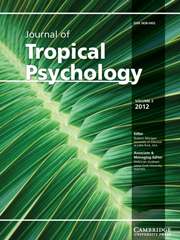Article contents
Hurricane Maria, personal and collective suffering, and psychosocial support as a cross-cutting intervention
Published online by Cambridge University Press: 14 December 2017
Abstract
Here we discuss the role of psychosocial support activities in the immediate aftermath of Hurricane Maria in Puerto Rico. We report comments from 630 survivors from 22 towns. The focus is given to reactions, risk factors and resilience. The responses of the survivors were divided into individual and community losses. We propose that the response to such a catastrophic event was psychosocial and give suggestions for psychosocial support during future disaster responses.
- Type
- Articles
- Information
- Copyright
- Copyright © The Author(s) 2017
References
American Red Cross model was utilized “Psychological First Aid: Helping Others in Times of Stress” (2017). Washington, DC.Google Scholar
Bonanno, G. A., Brewin, C. R., Kaniasty, K., & LaGreca, A. M. (2010). Weighing the costs of disaster: Consequences, risks, and resilience in individuals, families, and communities. Psychological Science in the Public Interest, 11, 1–49.Google Scholar
Forbes, D., Lewis, V., Varker, T., Phelps, A., O'Donnell, M., Wade, D. J., Ruzek, J. I., Watson, P., Bryant, R. A., & Creamer, M. (2011). Psychological first aid following trauma: Implementation and evaluation framework for high-risk organizations. Psychiatry, 74, 224–239.Google Scholar
Galea, S., Brewin, C. R., Gruber, M., Jones, R. T., King, D., King, L., et al. (2007). Exposure to hurricane-related stressors and mental illness after Hurricane Katrina. Archives of General Psychiatry, 64, 1427–1434.Google Scholar
Gurwitch, R., Hughes, L., Porter, B., Schreiber, M., Bagwell Kukor, M., Herrmann, J., & Yin, R. (2010). Coping in Today's World: Psychological First Aid and Resilience for Families, Friends, and Neighbors: Instructor's Manual. American Red Cross, Washington DC.Google Scholar
Irizarry Álvarez, F. (21 Sept. 2017) Mueren tres hermanas por derrumbe en Utuado tras paso de María. San Juan, PR: Diario Primera Hora. http://www.primerahora.com/noticias/puerto-rico/nota/muerentreshermanasporderrumbeenutuadotraspasodemaria-1246727/
Google Scholar
Nerkirk, V. R. (26 Sept. 2017). How Puerto Ricans on the mainland are getting news from relatives. The Atlantic Magazine. (https://www.theatlantic.com/politics/archive/2017/09/how-puerto-ricans-on-the-mainland-are-getting-newsfrom-relatives/541062/).Google Scholar
Osborne, S. (30 Oct. 2017) Hurricane Maria: More than 900 people in Puerto Rico have died after the tropical storm. Independent News. The United Kingdom.Google Scholar
Pares Arroyo, M. (29 Oct. 2017). Un ejercito de lideres se une para levanter a Cayey. San Juan, PR: El Nuevo Dia. Revista Dominical.Google Scholar
Shultz, J. M. & David Forbes, D. (2014). Psychological first aid: Rapid proliferation and the search for evidence. Disaster Health, 2, 3–12.Google Scholar
- 3
- Cited by


